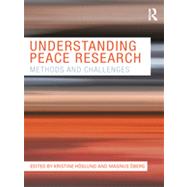
Note: Supplemental materials are not guaranteed with Rental or Used book purchases.
Purchase Benefits
Looking to rent a book? Rent Understanding Peace Research: Methods and Challenges [ISBN: 9780415571982] for the semester, quarter, and short term or search our site for other textbooks by H÷glund; Kristine. Renting a textbook can save you up to 90% from the cost of buying.
| List of boxes, figures and tables | p. ix |
| About the contributors | p. x |
| Acknowledgements | p. xii |
| Introduction | p. 1 |
| Doing Empirical Peace Research | p. 3 |
| The Origins of Contemporary Peace Research | p. 14 |
| Evaluating Information | p. 33 |
| Peace Research and Source Criticism: Using historical methodology to improve information gathering and analysis | p. 35 |
| Gathering Conflict Information Using News Resources | p. 47 |
| News Reports versus Written Narratives: Collecting information using different types of empirical sources | p. 74 |
| The Practice of Information Gathering | p. 89 |
| Systematic Data Collection: Experiences from the Uppsala Conflict Data Program | p. 91 |
| Comparative Field Research in War-torn Societies | p. 114 |
| In-depth Interviewing: The process, skill and ethics of interviews in peace research | p. 130 |
| Focus Groups: Safety in numbers? | p. 146 |
| Survey Research in Conflict and Post-conflict Societies | p. 165 |
| Conclusions | p. 183 |
| Improving Information Gathering and Evaluation | p. 185 |
| Bibliography | p. 199 |
| Index | p. 210 |
| Table of Contents provided by Ingram. All Rights Reserved. |
The New copy of this book will include any supplemental materials advertised. Please check the title of the book to determine if it should include any access cards, study guides, lab manuals, CDs, etc.
The Used, Rental and eBook copies of this book are not guaranteed to include any supplemental materials. Typically, only the book itself is included. This is true even if the title states it includes any access cards, study guides, lab manuals, CDs, etc.